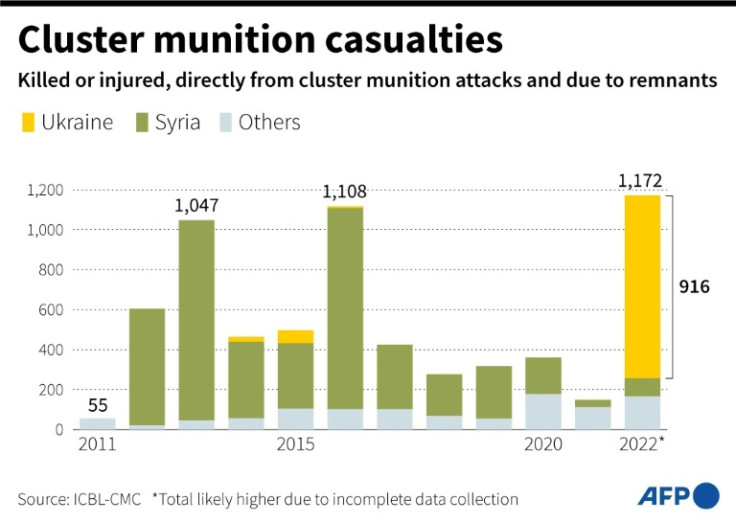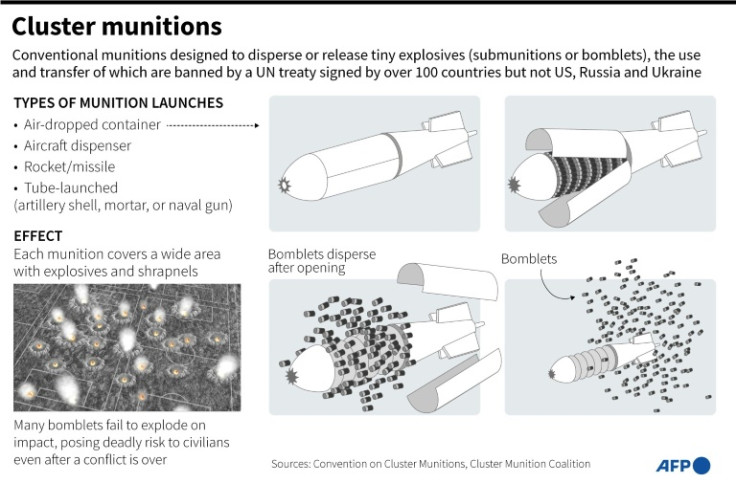916 Killed Or Injured By Cluster Munitions In Ukraine Last Year: Monitor

Over 900 people were killed or injured by cluster munitions in Ukraine last year amid broad Russian use of the widely-banned weapons, propelling global casualty figures to record levels, a report showed Tuesday.
Since Russia invaded Ukraine in February last year, it has "extensively" used stocks of old cluster munitions and newly developed ones, the Cluster Munition Coalition said in an annual report, adding that Ukrainian forces also used such weapons "to a lesser extent".
Ukraine had registered no cluster munition casualties for several years but recorded 916 deaths and injuries last year, nearly all of them involving civilians, it said.
"The vast majority of the cluster munition rocket missile and artillery attacks in Ukraine ... have been conducted by Russian forces," said Mary Wareham, the arms advocacy director at Human Rights Watch, who participated in the report.
"That is I think the major reason for the uptick in civilian casualties," she told reporters in Geneva.
The Ukrainian casualties accounted for the vast majority of the global figure, which rose to 1,172 in 2022 -- the highest since CMC began reporting in 2010.
A full 890 of the casualties registered in Ukraine -- 294 deaths and 596 injuries -- happened during attacks using cluster munitions, the monitor said.
Cluster munitions can be dropped from planes or fired from artillery before exploding in mid-air and scattering bomblets over a wide area.
They also pose a lasting threat, as many fail to explode on impact, effectively acting as landmines that can go off years later.
Twenty-six of the casualties recorded in Ukraine last year were caused by such remnants.
The report said 855 of the known casualties in Ukraine -- 93.3 percent -- were civilians, while 58 were military and three were deminers.
Loren Persi, a co-author of the report, stressed that many casualties could have gone unrecorded, pointing to indications that there were at least another 51 cluster munition attacks in 2022 where casualties were not recorded.
Beyond Ukraine, cluster munition attacks were registered last year in Syria and Myanmar, with such attacks across the three countries causing 987 casualties in total.
In 2021, no casualties were attributed to cluster munition attacks anywhere in the world.
At least 185 people were meanwhile killed or wounded by cluster munition remnants across Ukraine, Syria and Myanmar and five other countries: Azerbaijan, Iraq, Laos, Lebanon and Yemen, the report said.
That compares to 149 casualties in 2021, it said, pointing out that children make up over 70 percent of all casualties from cluster munition remnants.
Russia, Ukraine, Syria and Myanmar have not joined the convention prohibiting the use, transfer, production and stockpiling of cluster bombs, which has 112 state parties and 12 other signatories.
The United States, which is also not a party to the Convention on Cluster Munitions, meanwhile sparked widespread outcry in July with its decision to provide Kyiv the weapons.
"We were appalled by the decision," Wareham said, adding that her organisation had for a year been fighting the move "behind the scenes".
The last US company manufacturing cluster munitions halted production in 2016, but CMC warned the country was "developing and producing replacements for cluster munitions that may still fall under the definition of cluster munitions prohibited by the convention".
"We need to find out more about those particular weapon systems," Wareham said.

© Copyright AFP 2025. All rights reserved.





















